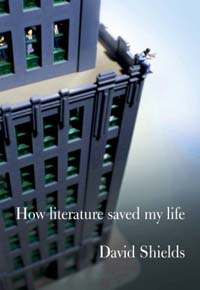David Shields — How Literature Saved My Life
 How Literature Saved My Life
How Literature Saved My Life
by David Shields
Knopf, February 2013
224 pages / $24.95 Buy from Amazon or Powell’s
Published last month, How Literature Saved My Life is both a boldly written love note to a most precious of subjects, and David Shields’s latest statute in his quest for “art with a visible string to the world.” Short of a true sequel to his polarizing 2008 “novel,” Reality Hunger, Shields’s latest work does devote more than a little page space to proselytizing for his vision of a world where fact and fiction combine and literary tropes like linear plot lines and fanciful character design fall by the wayside.
Sharing my current reading choice with friends — and an unsolicited suggestion that they look into it — it was a common to hear, But isn’t it just for writers and literature snobs?
Well, yes.
Casual readers may be able to sieve out the life lessons, but will likely find themselves drowning in a sea of name drops and literary in-jokes. Which is not to say that a novice reader couldn’t use the book to take studious notes and build a respectable reading list, but I wouldn’t consider that sort of parergonal use to be a huge selling point.
Truth is, how many summer readers are going to pick up a book called How Literature Saved My Life in the first place anyway? And it’s probably my fault for recommending it for a general audience, because it isn’t. Shields makes no bones about writing for a niche audience, one he can’t help but self-consciously wonder about with a market analyst’s zest, a fact of life for virtually any creative professional these days, whether we like it or not. Unabashedly, Shields probes this and other insecurities writers in the digital age run up against with far great frequency and impact than their predecessors.
Is literature worth writing anymore? Can it adapt without losing whatever attributes make it recognizable as “literature”? Who am I writing for? Franzen: Why bother?
For literary types with similar doubts, Shields’s writing comes across prescriptive, offering answers to questions lie those raised by Jonathan Franzen in Why Bother? (originally published as Perchance to Dream: In the Age of Images, a Reason to Write Novels), and in one sense answering David Foster Wallace’s charge against forms of literature that have no remedy for the ills they diagnose.
March 29th, 2013 / 12:00 pm
